An Author's Legacy
All the words we leave behind—the good, the bad, the ugly—should we censor them?
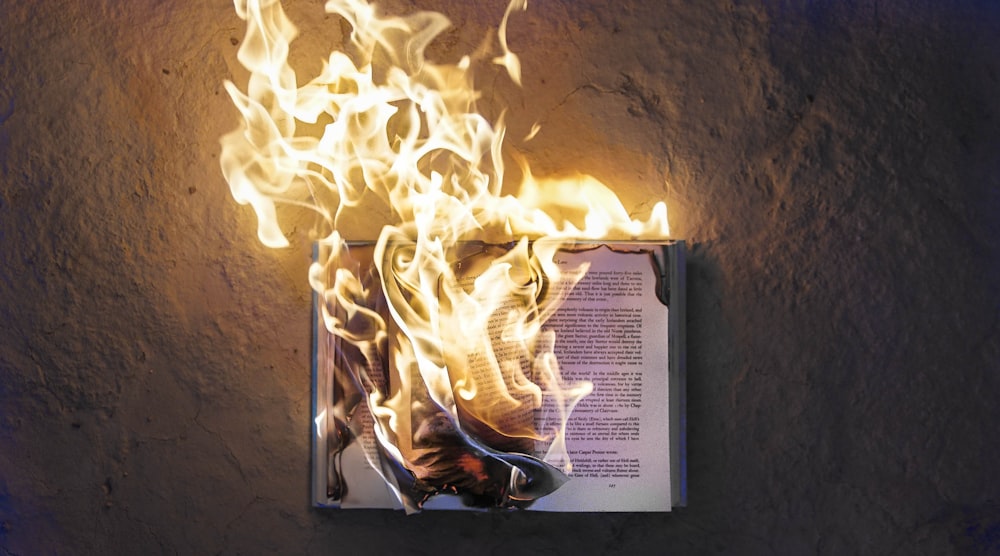
In the last couple of years, the news has been rife with stories of books being banned, librarians’ lives being threatened because they want to preserve books, and now another sort of phenomenon, editing books to be more “politically correct.”
Book banning is nothing new. Politicians and religious bodies have banned books since ancient times because words have power, and they educate the citizenry in ways that keep the people from being adequately controlled. As Ohio State professor emeritus Harvey J. Graff notes:
Banning books is an effort, unknowingly, to resurrect the early modern Roman Catholic Counter-Reformation against both radical Catholics and early Protestants, which attempted to halt unauthorized reading, including curtailing the ability of individuals to read for themselves. Then seen as a “protest,” individual access to written or printed texts was perceived as threatening in ways that controlled oral reading to the “masses” by a priest or other leader was not. It enforced orthodoxy and countered both collective and individual autonomy.
An educated populace is much harder for bad actors to control because that populace is more likely to think critically, ask the tough questions, notice when there is wrong-doing, and in general, demand more of their leaders.
And, of course, with the rise of authoritarianism and extremism in America (and in many other countries), you see a drastic increase in book bans.
According to PEN America:
From July 2021 to June 2022, PEN America’s Index of School Book Bans lists 2,532 instances of individual books being banned, affecting 1,648 unique book titles.
The 1,648 titles are by 1,261 different authors, 290 illustrators, and 18 translators, impacting the literary, scholarly, and creative work of 1,553 people altogether.
While these are staggering numbers and damaging on more than a few levels, it doesn’t stop anyone from reading those books. I don’t know about you, but I remember having many conversations when I was young with other kids who managed to get ahold of “questionable” or contraband reading and told everyone else about it. I’m not sure I would have ever chosen to read D.H. Lawrence at the age of ten or eleven if that hadn’t been the case. And kids still managed to find their dad’s stashes of Penthouse and tell everyone else about it. The more you ban books, the more people want them or want to talk about them. In fact, after being banned, many books see their sales numbers rise more than a hundredfold, landing them solidly on the bestseller lists.
Additionally, what a lot of book banners don’t stop to think about is that in today’s day and age, banning books in 2023 doesn’t typically mean you can no longer access the books. Even if you did have a pyre for books to burn in the back forty behind your school, the books aren’t gone. They have digital futures that live on and make them easier to access than ever. Sure, it might mean a child won’t run across the book on a shelf, but savvy parents can still acquire those books, and savvy kids can access many of them digitally.
Sometimes the response to the power of books goes the other way. This week the news has been about changing Roald Dahl’s works to be more inclusive.
“The changes were approved by the Roald Dahl Story Company and the books' publisher, Puffin Books, and carried out by a sensitivity organization for children's books called Inclusive Minds.”
The changes have sparked all sorts of backlash. And, in my mind, for good reason. Take a look at the differences here:

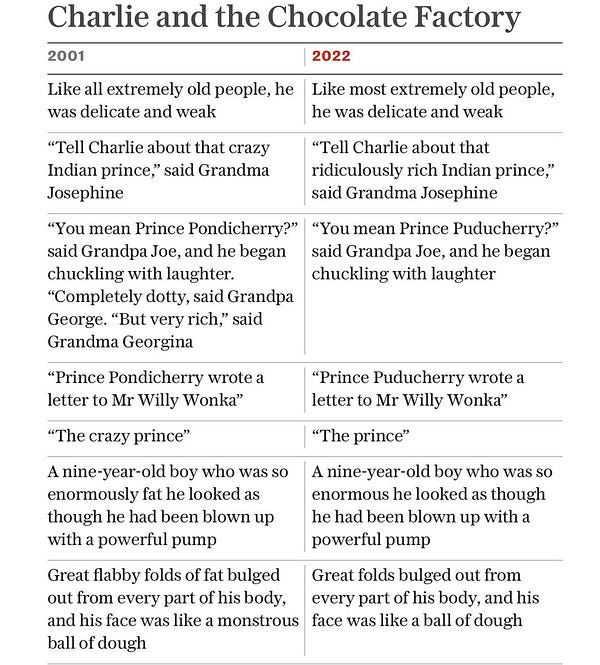
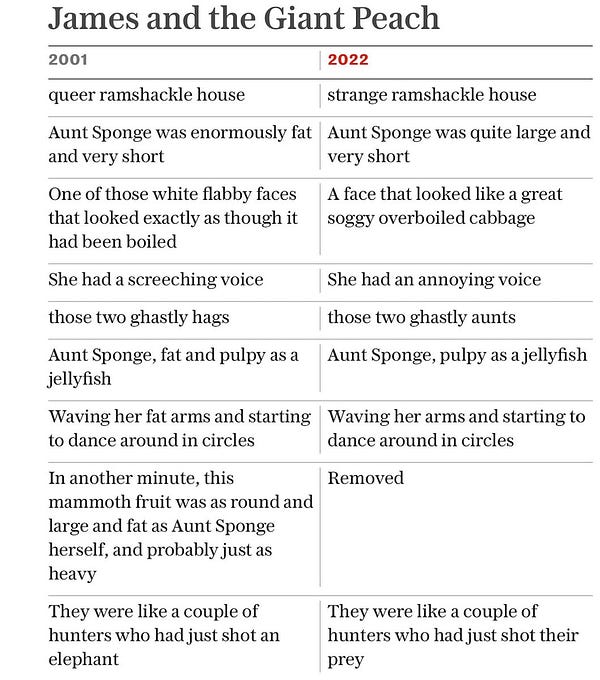
And some more comparisons:


Now, Roald Dahl wasn’t a great human being. He was a terrible anti-semite. His works were often sadistic, misogynistic, and full of awfulness. But if we have to start censoring and changing books of the past to meet the sensitivities of the now, we’re going to have precious few books left. So many authors were just horrible people, and countless classic books, comics, movies, music, and plays do not jibe with the current dialogue of 2023. Should we censor Shakespeare for his xenophobic sensibilities of Renaissance England? Or Jane Austen for her complacent acceptance of class structure (and lack of diversity) in the relationships of her characters? Or, for that matter, why aren’t we going after the Bible for its blatant adultery, murder, incest, and misogyny? Stories are imperfect, like people are imperfect, like history is imperfect, and life is imperfect. We only grow and learn by looking backward at these imperfections and improving upon them.
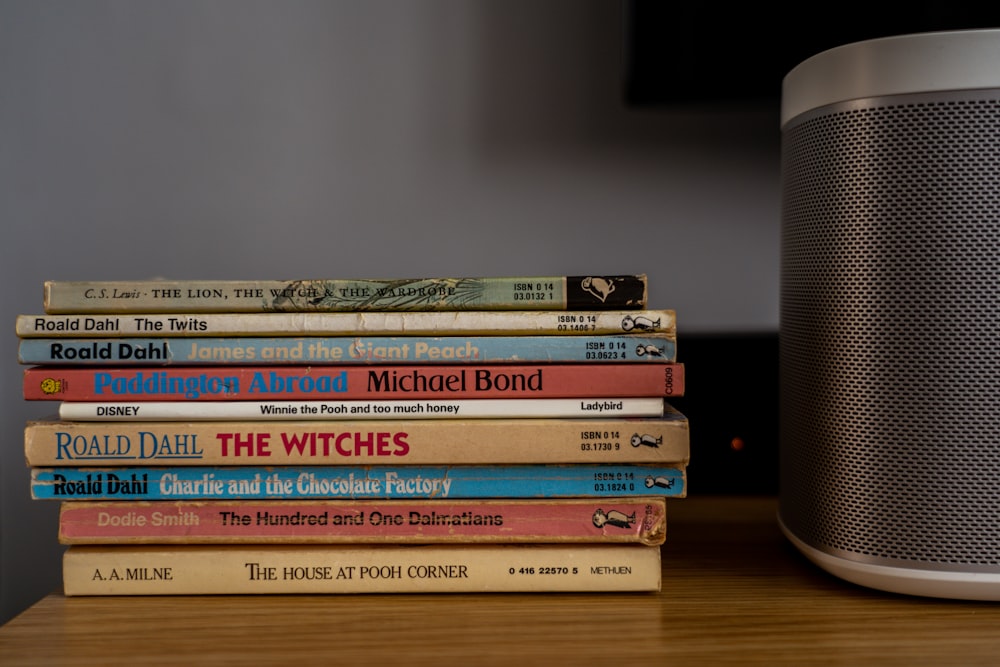
To that end, I don’t believe we should be changing Dahl’s works. We should be learning from them and teaching our children to read with a critical eye. But we should also give kids some credit. They know bullying when they see it. They understand when kids ridicule other kids and why they do it. Dahl’s books cut through into a reality that kids could easily (and still can) grasp. If we teach our kids right from wrong, they’ll be able to understand the more problematic parts of books.
Plus, there are better ways to handle books like Dahl’s. Author Phillip Pullman suggests that we could let them go out of print. Perhaps. I believe teachers and parents should use them as a learning opportunity. And more importantly, publishers and the media should start promoting other books that portray more equitable and fair relationships between the characters.
I say this because we can always learn from books, even if they are problematic or they make us feel uncomfortable. Nabokov’s Lolita made me profoundly uncomfortable, but I still think it should be read and taught. Once, I almost fainted on a bus while reading Kafka’s In the Penal Colony because it was so unsettling. But it made me think, and I still vividly remember that story thirty years later. Same for Octavia Butler’s Kindred, a book meant to make us uncomfortable, a book which is still deeply emblazoned upon my mind.
I can’t imagine Nabokov, Kafka, Butler, or Dahl, for that matter, would take lightly to their works being changed posthumously to satisfy modern sensibilities or, worse, insensibilities. Sometimes, in life, authors may decide to change or update books, much like how Judy Blume updated her book, Are You There God, It’s Me Margaret, to be more with the times. When I read the book, a story about young people entering puberty, the girls were still wearing pads attached to garter belts, which was updated in later versions. But of those authors that are not alive, who are we to change their words on the page? To shift their intent (even if the intent isn’t one we might agree with)? I know I would rain down fury from the afterlife if someone changed a single word of one of my books after I died.
Puffin says they are being inclusive with the changes to Dahl’s works, but Atlantic writer Helen Lewis points out two big problems:
In these conditions, the gravitational pull for companies wishing to make blockbusters is toward blandness: Delete anything anywhere that might upset anyone. But you can’t do this to Dahl—the offensiveness is braided through the work so tightly that unpicking the individual strands is impossible.
One, this sort of censorship renders culture uninteresting—it strips art of its humanity, warts, and all. It’s removing that which teaches us important lessons about the world around us. And two, trying to homogenize some works of art is rather like putting lipstick on a pig. The pig is still a pig, just with a messy snout.
Lewis then asks the most important question about Dahl: “If his work is really this bad, why even try to save it?”
Yes, why?
Counter Craft writer Lincoln Michel hits the nail on the head when he says the changes are about corporate profits. Rather than see sales dwindle of a book that parents and teachers don’t want to promote, Puffin thinks the answer is to update it so they can continue to profit off its former popularity.
The answer should be, instead, to champion NEW books from diverse writers about more inclusive topics. Why can’t THAT be the answer rather than changing books long since in print? There is a plethora of books out there which could fill the gap.
Ironically, this controversy is likely just helping Puffin sell more books as fans race to scoop up as many copies of the unchanged versions as possible. It’s the same thing that happens when you try to ban books—when you try to take something away, suddenly, everyone wants it.
Wow, that was a soapbox and a half, wasn’t it? I promise a more upbeat topic in my next post!
A NEXT DAY UPDATE: AP press is reporting the following: “Along with the new editions, the company said 17 of Dahl’s books would be published in their original form later this year as The Roald Dahl Classic Collection so ‘readers will be free to choose which version of Dahl’s stories they prefer.’”
Here’s a more nuanced version of this story in Publisher’s Weekly.
I.e. the publisher is likely patting themselves on the back for this amazing coup of being able to publish both books and raking in even more now that there is a new thirst for the classic editions.
What’s Bringing Me Joy This Week:
CatGPT 😻is making the world better with more meows.
This thread, in which author Joseph Fasano is on a plane and realizes the person next to him is reading his book, The Swallows of Lunetto. The book pictured here is a hardback, and the novel is only available in paperback, so I smell a bit of a plant, but if so, it’s brilliant guerilla marketing. If not, it’s a touching story that every author dreams about.
Actress Lea Thompson shared this wonderful reunion photo of the Back to the Future cast on Instagram.
Two versions of a classic…the original Muppet performance of "Mah-Na, Mah-Na" composed by Piero Umiliani, the song first written for use in the Italian film "Sweden - Heaven and Hell" (1968).
And the Muppet Show version, which many of you will know and love.
Thanks for joining me this week! If you haven’t read THE CHEF’S SECRET or FEAST OF SORROW, click the links to learn where to buy your copy! 🍒🍗🍷
You can also follow me in these places too:
Website | Instagram | Facebook | Mastodon





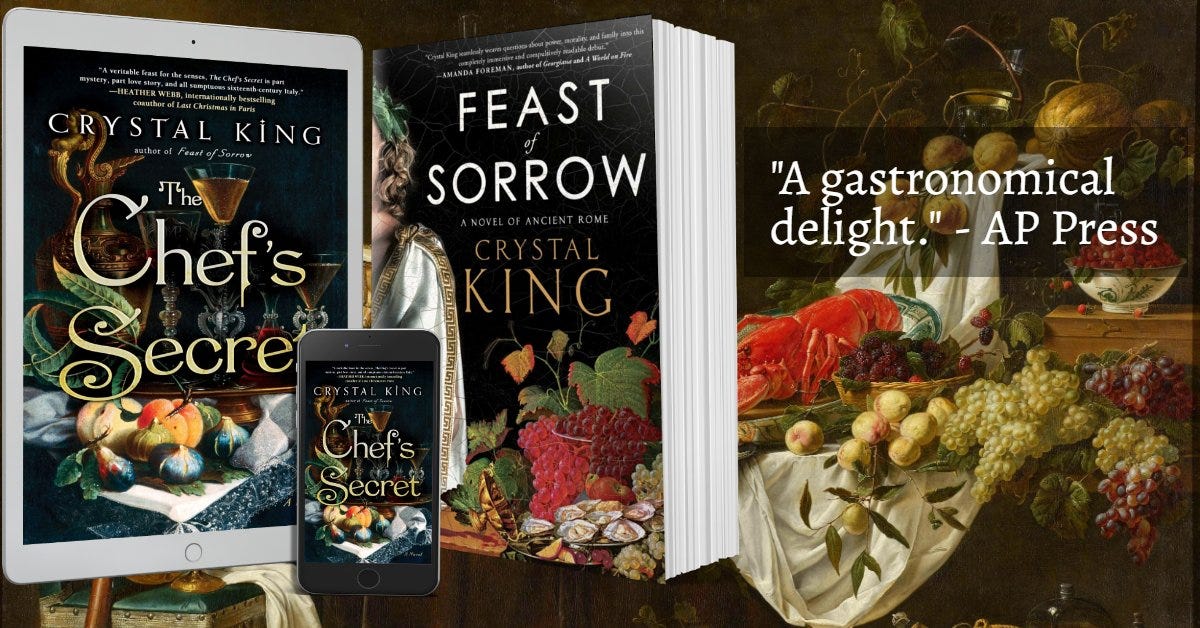
Thanks so much for writing this! I clicked through to see the changes and got enraged all over again, particularly around the complete removal of the word fat. As a fat person myself the absolute ignorance of the move makes my blood boil. The problem with body image in society was never the word fat but the perceptions around that word. Removing the word fat stigmatizes a perfectly useful adjective and does absolutely nothing about changing the way society worships at the the alter of starvation physiques. Striking a red pen through the word fat is the thoughts and prayers of body empowerment--useless rhetoric designed to make the person holding the pen feel better while doing absolutely nothing to make substantive changes.
Thank you for coming to my Ted Talk. :)
Kids love the bad guys and can understand that is their role. A Series of Unfortunate Events, the book series won't ruin kids, as we know. Some parents roll their eyes and gasp, but kids get it.